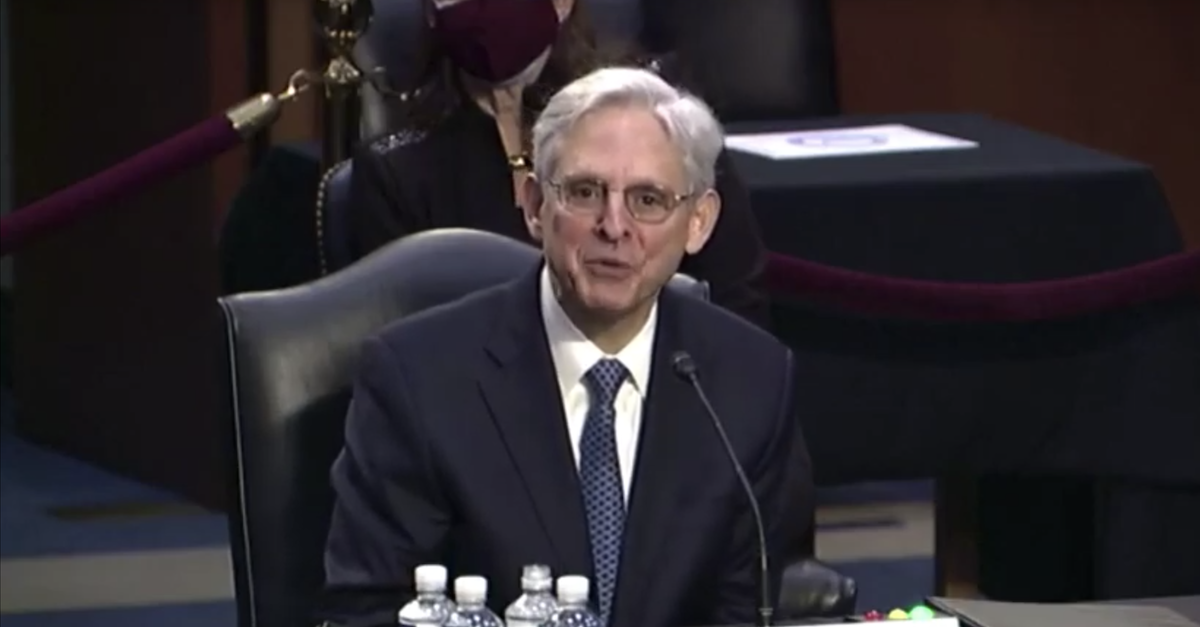
Judge Merrick Garland breezed through another step toward his confirmation as U.S. Attorney General on Monday, winning bipartisan support in the Judiciary Committee paving the way for an upcoming Senate vote.
Widely respected by both sides of the aisle, Garland’s title may have been Supreme Court justice had former Senate Majority Leader Mitch McConnell (R-Ky.) not blocked a hearing and a vote on his confirmation roughly half a decade ago. McConnell had cited a supposed custom that justices should not be confirmed in the final year of a presidential term, a rule he subsequently disregarded during the confirmation of Justice Amy Coney Barrett, but President Joe Biden finished up his former boss Barack Obama’s work with a new nomination—this time, for attorney general. Democratic control of both branches of Congress left no doubt that Garland would get a hearing.
Last week, Garland passed his first Senate audition with praise from bipartisan lawmakers and witnesses, and his vote reflected that consensus: 15-7.
The Republican party’s far-right flank, including Donald Trump-loyalist Senators Josh Hawley of Missouri, Mike Lee of Utah, and Ted Cruz of Texas, were left howling in the margins.
If confirmed by the Senate, as is widely expected to happen, Garland signaled that he will bring his experience prosecuting the Oklahoma City bombing cases to the hundreds of cases that comprise the U.S. Capitol insurrection docket.
“From 1995 to 1997, I supervised the prosecution of the perpetrators of the bombing of the Oklahoma City federal building, who sought to spark a revolution that would topple the federal government,” Garland said in his opening remarks last week, drawing the parallels several other legal observers already had made. “If confirmed, I will supervise the prosecution of white supremacists and others who stormed the Capitol on January 6—a heinous attack that sought to disrupt a cornerstone of our democracy: the peaceful transfer of power to a newly elected government.”
Garland promised Sen. Sheldon Whitehouse, a Rhode Island Democrat who was also a prosecutor, that he would not hesitate to look “upstream” for participants in the siege who may not have been in the building on that day.
“We begin with the people on the ground and we work our way up to people involved and further involved,” Garland told the senator last week. “We will pursue these leads wherever they take us. That’s the job of a prosecution.”
Multiple Republican senators pressed Garland to commit to letting John Durham finish up his probe into the origins of the Russia investigation, only to be rebuffed by the judge, who was reluctant to make any decisions before actually holding the position of attorney general. Durham subsequently resigned as U.S. Attorney but said he would see out that probe as a special counsel.
The Judiciary Committee’s top Republican, Senator Chuck Grassley of Iowa, expressed dismay that Garland would not make that commitment before assuming his position as attorney general and claimed the judge’s credibility would be on the line on that issue.
“It will be up to him from keeping the Justice Department from turning into the Social Justice Department,” Grassley said. “I plan to vote for him. I hope that my trust for him is not misplaced.”
The Committee’s Chairman Dick Durbin (D-Ill.) applauded the advancement of a “man of extraordinary qualifications.”
“His life has been dedicated to public service and advancing values that are vital to the Justice Department’s functioning—integrity, independence, fidelity to the rule of law, and a commitment to equal justice for all,” Durbin said. “The nation needs this kind of selflessness in a nominee. America will be better with this kind of person leading the Justice Department.”
(Screenshot from Merrick Garland’s Senate Judiciary confirmation hearing)